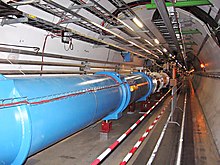Large particle accelerators to explore the frontiers of physics
Tuesday, September 16, 2008

The Large Hadron Collider (LHC) that started preliminary experiments on September 10, 2008 in CERN, Geneva, and the planned International Linear Collider (ILC) will carry out a series of experiments in the future to validate the standard model of particle physics. The model predicts that Higgs boson particles gives mass to all fundamental particles and explains the existence of dark matter, or invisible matter in between galaxies.
The LHC is a 27 kilometer long circular high energy particle accelerator which took more than 20 years and USD $9 billion to build. In the next few weeks the machine will collide opposing beams of protons charged with approximately 7 TeV of energy resulting in cataclysmic conditions that will mimic the beginning of time, a re-creation of the Big Bang.
An upgraded version of the LHC was announced, nicknamed the "super LHC". The new accelerator will perform ten times the number of collisions as the current LHC over the same time. The upgrade will feature a new injection system and enhanced detectors to cope with the increase in data packets from collisions.
The bigger International Linear Collider, nicknamed "Einstein's telescope", is planned by the International Technology Recommendation Panel (ITRP). The ILC will have a collision energy of 500 GeV and will collide electrons with particles of antimatter, called positrons, along a 30-40 km completely straight tunnel. The ILC's two giant "guns" pointing at each other would be able to accelerate electrons and positrons to near-light speeds before smashing them together.
"The LHC smashes protons together to discover new particles but also generates lots of debris that obscures the fine detail. The ILC would be a much cleaner machine and tell us far more about their real nature." says Brian Foster, professor of experimental physics at Oxford University and European director of the project. The host country for the ILC has not yet been chosen but it is planned to have the machine constructed by late 2010. The new machine will cost an estimated USD $7 billion to build. Physicists hope that ILC might be able to resolve some of the questions raised by Einstein's theories of relativity.
Sources
- Jonathan Leake. "Large Hadron Collider could help fight cancer" — Times Online, September 7, 2008
- John Roach. "Large Hadron Collider to Have "Practical" Spin-Offs?" — National Geographic News, September 10, 2008
- "Physicists Start Testing Big Bang Theory" — InformationWeek, September 10, 2008
- "Mad scientists plan an even bigger bang with a bigger Collider" — SiliconRepublic, September 14, 2008
- Jonathan Leake. "Sit tight, a bigger bang is coming" — The Sunday Times, September 14, 2008
- Roger Highfield. "Large Hadron Collider: Scientists plan upgrade to 'Super LHC'" — Telegraph, September 15, 2008

